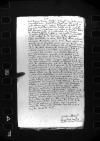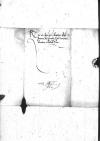⌊Bartholomeo Vogt⌋, cum ⌊hic⌋ esset, ne quid obtinere posset, magna diligentia restiti et in praesentia ⌊reverendissimi domini⌋ pluribus verbis cum eo contendi. Vidi hominem pertinacem, qui nullis rationibus deduci de sententia posset et importunitate sua vincere conaretur, sed eum rediturum non arbitror. Si redibit, ita, ut mandat Reverendissima Dominatio Vestra, omni studio, quantum potero, providebo, ne aures ⌊reverendissimi domini⌋ illius pateant calumnis, quamquam ipsum reverendissimum dominum, causa iam cognita, pro eo praesertim animo, quo est reverendissimus dominus erga Reverendissimam Dominationem Vestram, sat scio facturum, ut ne deinceps ⌊eum⌋ ad se admittat.
Narapinscki canonicus in ⌊urbe ⌋est mortuus. Itaque is non rediit, nisi fortasse aut propinquus, aut servitor eius aliquis: ceterum de seminibus lactucarum, quomodo se res habeat, rescire conabor ac faciam Reverendissimam Dominationem Vestram de eo, quod cognovero, certiorem. Facies ⌊caesaris Turcarum⌋ ipsissima esse dicitur. Ita enim affirmat dominus ⌊Soboczki⌋, qui legatus apud illum fuit. De appellationibus, quae sit s(acrae) ⌊maiestatis regiae⌋ sententia, ex illius litteris Reverendissima Dominatio Vestra cognoscet. De domino ⌊Plotowscki⌋ praeposito provisum est, ne quis ei negotium facessat, nam in ius defuncti ⌊Quirini⌋ substitutio petita est. An obtenta, nondum scio. Dominus ⌊Opalinscki⌋ restitutus esse dicitur pristinae bonae valetudini; in aula non est. Dominus ⌊Ioannes a Lasco⌋ iusiurandum fecit, cuius exemplum Reverendissimae Dominationi Vestrae mitto. Rediisse fertur ad sacerdotiorum quorundam possessionem.
Ex ⌊Hungaria⌋ nihil affertur. Neque de reditu in regnum quicquam adhuc certi habemus, etsi spe bona sumus, quae utinam nos paper damaged⌈[os]os paper damaged⌉ non fallat. De ⌊caesare⌋ ex ⌊Italia⌋ tristissima sunt h paper damaged⌈[h]h paper damaged⌉uc allata, confirmatur enim rumor de horrendo nau paper damaged⌈[nau]nau paper damaged⌉fragio, quod fecerit, sed collectae tandem naves fer paper damaged⌈[fer]fer paper damaged⌉untur, quae submersae putabantur, ita ut non tantu paper damaged⌈[tu]tu paper damaged⌉m esse in re dicatur, quantum fuerit in sermone. Hoc nunc ex ⌊reverendissimo domino⌋ audivi, ex cuius ore haec scripsi. Plura per Elbingensem scribam.
Deum precor, ut Reverendissimam dominationem Vestram diu servet incolumem et felicem. Cuius me gratiae commendo.


 AAWO, AB, D. 19, No. 24_2
AAWO, AB, D. 19, No. 24_2